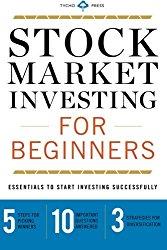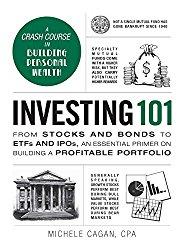
OK, so you’ve been interested in individual stock buying for a while, have saved up some money, and are looking to buy your first shares. Or maybe you are just starting to save money and wonder how much you need to save to be ready. Today we’ll talk about how much is needed to get started in stock investing, and how many shares you should plan to buy starting out.
First, make sure you are actually ready to start investing in individual stocks and that you have the right expectations. To be ready to invest in individual stocks you should:
- Have your credit cards all paid off. There is no reason to be investing while you’re paying credit cards 12% interest or more. Pay off you high interest debts, then think about investing.
- Have an emergency fund of at least $9,000. If you don’t have a good emergency fund, you’ll have just bought your first shares, then need to sell them to pay for something that breaks. Or worse, you’ll pull out the credit card to pay the bill, starting you into debt. Note this does not apply if you’re under 18 since you have your parents to pay the bills – and this is a great time to first start investing.
- Be putting at least 10% of your pay into a retirement fund, This could be a 401k, 403B, or even an IRA. This money should be invested almost exclusively in a diversified set of low-cost mutual funds. You still want to be able to retire even if you’re a bad stock picker.
- Be ready to leave your money alone for at least 5-10 years. Stock investing, particularly individual stock investing, is a long-term game. Investing for anything less than five years is just gambling.
- Have money you can afford to lose. Individual company stocks can and do go bankrupt. You should allow the possibility of losing ever dime you invest.


If you pass the criteria above, you might be ready to start individual stock investing. While you can buy any number of shares, if you’re investing to make money, you’ll probably want to try to buy at least 100 shares, or what is called a “round lot.” Invest less than this, and the amount you’re paying in commissions will start to make it really difficult to succeed. You’ll also want to pick a stock in the $10-$30 range, which will mean you’ll need about $1100-$3100, when you include commissions.
If you’re not really investing to make money, but instead just want the fun of holding a few shares, you can buy around 10 shares. We bought 10 shares of Home Depot for $300 for my son when he was born, and now (15 years later), his holdings are worth about $1200. Even better , he gets a dividend every three months which has been steadily increasing.
Finally, if you really are serious about single stock investing, and you can afford to take the loss if something goes wrong, you should try to buy in increments of 500-1000 shares. At this level you will really profit if you are right and the company does well. If you hold 100 shares of company XYZ and they go from $20 to $60, you’ve only made $4,000. This is nice, but really not that substantial in your life. If you have 1000 shares, you’ll have made $40,000. That’s enough for a year in college, a good down-payment on a house, or a couple of high quality, late model used cars.

How about a new tie? WeiShang Classic Men’s 100% Silk
Neckties for less than $25
Getting to 1000 shares may take a while and require some build-up. In fact, it is probably better to buy in increments of 200-300 shares a few times rather than buying 1000 shares all at once since then you can pick up more shares on dips and get a better price. In fact, to reduce your risk, you should probably pick up 200-300 shares of stock A, then 200-300 shares of stock B, then 200-300 shares of stock C. Then, buy more of whichever company’s shares are the best bargain when you’re ready to buy more. Of course, sometimes a stock will take right off after your first purchase and never look back, so you never know.
Have a burning investing question you’d like answered? Please send to [email protected] or leave in a comment.
Follow on Twitter to get news about new articles. @SmallIvy_SI
Disclaimer: This blog is not meant to give financial planning or tax advice. It gives general information on investment strategy, picking stocks, and generally managing money to build wealth. It is not a solicitation to buy or sell stocks or any security. Financial planning advice should be sought from a certified financial planner, which the author is not. Tax advice should be sought from a CPA. All investments involve risk and the reader as urged to consider risks carefully and seek the advice of experts if needed before investing.
